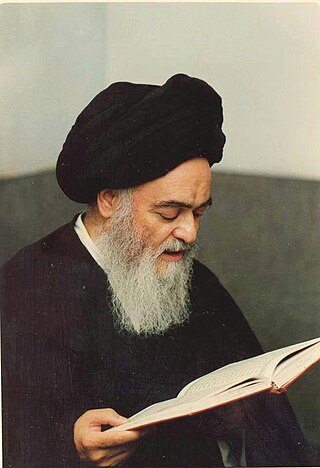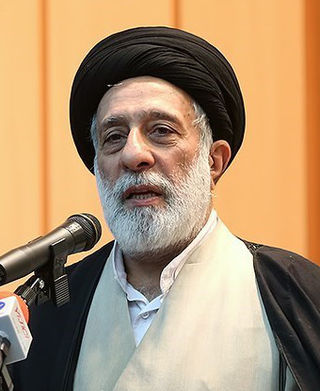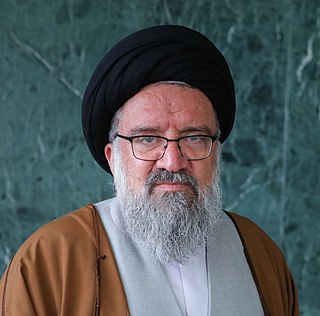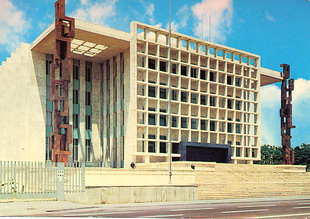Related Research Articles

Ruhollah Musavi Khomeini was an Iranian Islamic revolutionary, politician and religious leader who served as the first Supreme Leader of Iran from 1979 until his death in 1989. He was the founder of the Islamic Republic of Iran and the main leader of the Iranian Revolution, which overthrew Mohammad Reza Pahlavi and ended the Iranian monarchy. Ideologically a Shia Islamist, Khomeini's religious and political ideas are known as Khomeinism.

Grand Ayatollah Hussein-Ali Montazeri was an Iranian Shia Islamic theologian, Islamic democracy advocate, writer, and human rights activist. He was one of the leaders of the Iranian Revolution and one of the highest-ranking authorities in Shīʿite Islam. He was once the designated successor to the revolution's Supreme Leader, Ayatollah Khomeini; they had a falling-out in 1989 over government policies that Montazeri claimed infringed on people's freedom and denied them their rights, especially after the 1988 mass execution of political prisoners. Montazeri spent his later years in Qom and remained politically influential in Iran but was placed in house arrest in 1997 for questioning "the unaccountable rule exercised by the supreme leader", Ali Khamenei, who succeeded Khomeini. He was known as the most knowledgeable senior Islamic scholar in Iran, a grand marja of Shia Islam, and was said to be one of Khamenei's teachers.

The Assembly of Experts, also translated as the Assembly of Experts of the Leadership or as the Council of Experts, is the deliberative body empowered to appoint the Supreme Leader of Iran. All directly elected members must first be vetted by the Guardian Council.

Abdollah Noori is an Iranian cleric and reformist politician. Despite his "long history of service to the Islamic Republic," he became the most senior Islamic politician to be sentenced to prison since the Iranian Revolution, when he was sentenced to five years in prison for political and religious dissent in 1999. He has been called the "bête noire" of Islamic conservatives in Iran.
Special Clerical Court, or Special Court for Clerics is a special Iranian judicial system for prosecuting crimes, both ordinary and political, committed by Islamic clerics and scholars. The Special Clerical Court can defrock and disbar Islamic jurists, give sentences of imprisonment, corporal punishment, execution, etc. The court functions independently of the regular Iranian judicial framework, with its own security and prison systems, "generally secret and confidential" cases, proceedings and procedures, and is accountable only to the Supreme Leader of Iran,. The most senior Islamic politician to be prosecuted and sentenced to prison since the Iranian Revolution was Abdollah Nouri who was sentenced to five years in prison for political and religious dissent by the court in 1999.

Mohsen Kadivar is a mujtahid, Islamic theologian, philosopher, writer, leading intellectual reformist, and research professor of Islamic Studies at Duke University. A political Iranian dissident, Kadivar has been a vocal critic of the doctrine of clerical rule, also known as Velayat-e Faqih, and a strong advocate of democratic and liberal reforms in Iran as well as constructional reform in understanding of shari'a and Shi'a theology. Kadivar has served time in prison in Iran for his political activism and beliefs.

Mohammad Reyshahri, also known as Mohammad Mohammadi-Nik, was an Iranian politician and cleric who was the first Minister of Intelligence, serving from 1984 to 1989 in the cabinet of Prime Minister Mir-Hossein Mousavi.

Grand Ayatollah Sayyid Muhammad al-Husayni al-Shirazi, commonly known as Imam Shirazi, was an Iranian-Iraqi Shia marja' and political activist.

Hujjat al-Islam Sayyid Hadi Khamenei is an Iranian reformist politician, mujtahid and linguist. He is a key member of the reformist Association of Combatant Clerics, and a former deputy of the Majlis of Iran representing a district in Tehran.

Yousef Saanei was an Iranian Twelver Shi'a Marja' and politician, a member of the Islamic Republic of Iran's powerful Guardian Council from 1980 to 1983 and also Attorney-General of Iran from 1983 to 1985.

Sayyid Mohammad Mousavi Khoeiniha is an Iranian cleric and secretary general of the reformist Association of Combatant Clerics. He was the founder of the now defunct Salam and was a member of the Expediency Discernment Council.

Ayatollah Ahmad Khatami is a senior and prominent Iranian Muslim cleric, member of Guardian Council and a senior member of the Assembly of Experts. In December 2005, Ali Khamenei appointed him as Tehran’s substitute Friday prayer leader. He is also a conservative and principlist politician.

Grand Ayatollah Sayyid Muhammad-Sadiq Husayni Rohani was an Iranian Shia marja'.

The Society of Seminary Teachers of Qom is an Iranian group founded in 1961/3 by the leading Muslim clerics of Qom. Established by the students of Ayatollah Khomeini after his exile to Iraq, it was formed in order to organize political activities of Khomeini's followers and promote his revolutionary interpretation of Islam, such as the idea of Islamic government. Since the 1979 revolution, it has largely become the body to keep the regime's registrar of who counts as a grand ayatollah, an ayatollah and a hojjat ul Islam. It has a head who is appointed by the Supreme Leader of the Islamic Republic. It currently heads the Supreme Council of Qom Hawzas, and proposes judges to the judiciary system. The body gained international prominence when it announced in 1981 that Ayatollah Shariatmadari was no longer a source of emulation (marja'). It has demoted a number of clerics over the last three decades. A recent case was that of Ayatollah Yousef Saanei, who for his solidarity with the green movement was demoted from marja' to hojatoleslam. The society also includes Ayatollah Sistani on its list.

The Assembly for the Final Review of the Constitution also known as the Assembly of Experts for Constitution, was a constituent assembly in Iran that was convened in 1979 to condense and ratify the draft prepared beforehand for the Constitution of the Islamic Republic of Iran.
Grand Ayatollah Sayyid Hassan Tabatabaei Qomi was a prominent Shia marja' who was born in Najaf but lived in Mashhad, Iran. He was the son of Seyyed Hussein Qomi, and the brother of Seyyed Taqi Qomi.
Ayatollah Nematollah Salehi Najafabadi was an Iranian cleric, scholar and proponent of Islamic Unity, who spent most years after the Iranian revolution of 1979 under house arrest.

The supreme leader of Iran, also referred to as Supreme Leader of the Islamic Revolution, but officially called the Supreme Leadership Authority, is the head of state and the highest political and religious authority of the Islamic Republic of Iran. The armed forces, judiciary, state radio and television, and other key government organizations such as the Guardian Council and Expediency Discernment Council are subject to the Supreme Leader. According to the constitution, the Supreme Leader delineates the general policies of the Islamic Republic, supervising the legislature, the judiciary, and the executive branches. The current lifetime officeholder, Seyyed Ali Hosseini Khameneh known as Ali Khamenei, has issued decrees and made the final decisions on the economy, the environment, foreign policy, education, national planning, and other aspects of governance in Iran. Khamenei also makes the final decisions on the amount of transparency in elections, and has dismissed and reinstated presidential cabinet appointees.

Ayatollah Sayyid Mohammad Khamenei is an Iranian cleric and politician. He is the older brother of Ali Khamenei, the current Supreme Leader of Iran, and Hadi Khamenei. Currently, he is the president of Iranology Foundation, and Sadra Islamic Wisdom Foundation, he is a professor at Allameh Tabataba'i University, School of International Relations and Al-Zahra University. He was also one of the compilers of the Constitution of the Islamic Republic of Iran and a member for the Islamic Consultative Assembly representing Mashhad.

Seyed Abolfazl Rihani, was known as Ayatollah Seyed Abolfazl Mousavi Tabrizi. He was a member of the Assembly of Experts, involved with the creation of the Constitution of the Islamic Republic of Iran being a member of the Assembly of Experts for Constitution, and was the Prosecutor-General of Iran.
References
- 1 2 3 4 5 6 7 Islam and gender: the religious debate in contemporary Iran, Part 2 By Ziba Mir-Hosseini
- ↑ Mohammadighalehtaki, Ariabarzan (2012). Organisational Change in Political Parties in Iran after the Islamic Revolution of 1979. With Special Reference to the Islamic Republic Party (IRP) and the Islamic Iran Participation Front Party (Mosharekat) (PhD thesis). Durham University. p. 176.
- 1 2 See Mirjam Künkler (13 May 2009). "The Special Courts of the Clergy and the Repression of Dissident Clergy in Iran". doi:10.2139/ssrn.1505542.
{{cite journal}}: Cite journal requires|journal=(help) - ↑ FDI Newswire Number 36 Feb. 18, 1997
- ↑ BRIEF ON IRAN, No. 787, Thursday, November 20, 1997, Representative Office of The National Council of Resistance of Iran, Washington, DC, Montazeri: Khamenei Should Have A Supervisory Role, Reuter, November 19
- ↑ "Action memorandum 037 – The Foundation for Democracy in Iran". December 4, 1997.
- ↑ Kadivar, Mohsen (24 February 2014). "The Rise and Fall of Azari Qomi; The Evolution of Ayatollah Ahmad Azari Qomi's Thought". english.kadivar.com/. Retrieved 24 February 2023.
- ↑ Iran Report, 8 February 1999, Volume 2, Number 6, RISE AND FALL OF REGIME STALWART